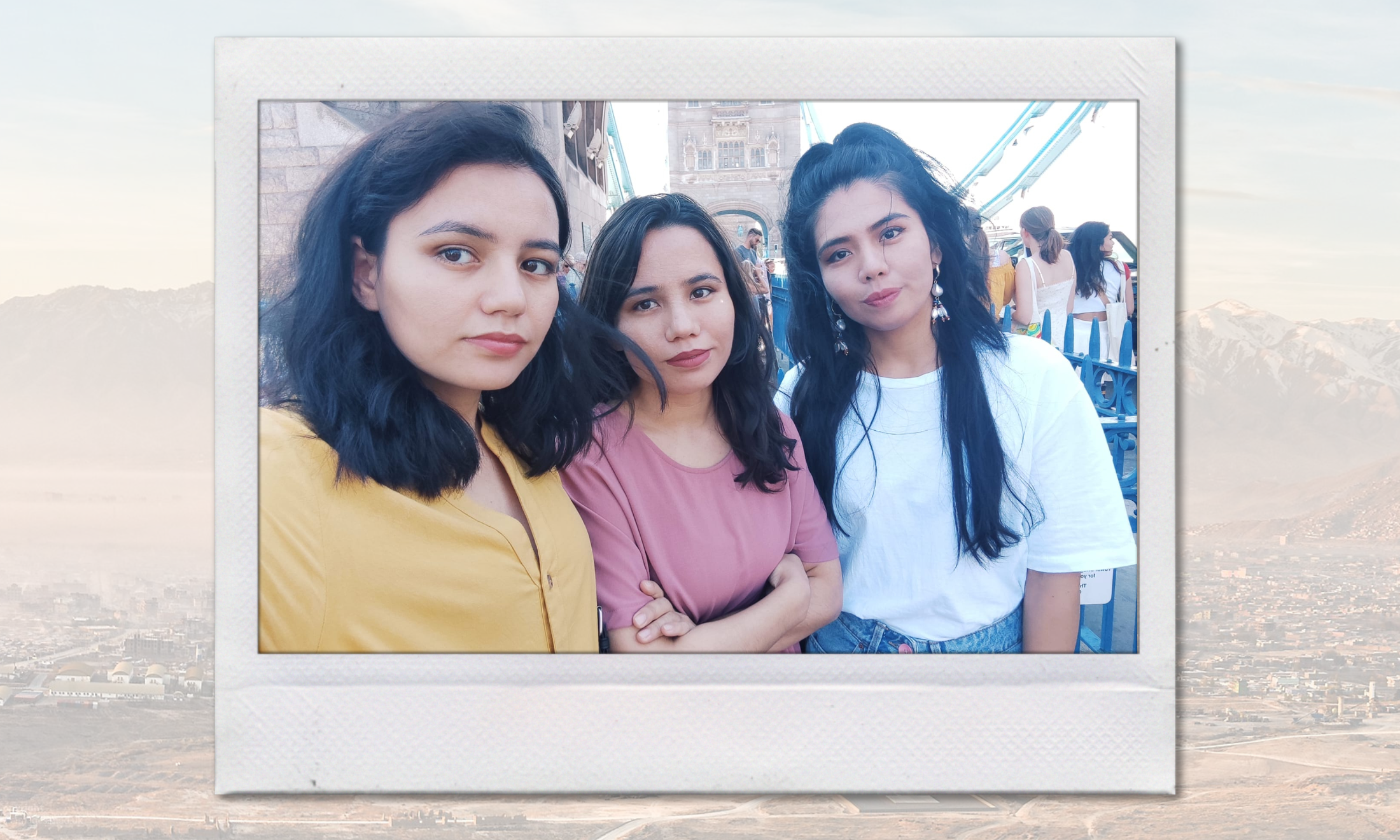
Canva/Karima Jamili
‘We left Kabul with broken hearts’: the story of one Afghan refugee who lost everything when the Taliban returned
Karima Jamili and her sisters fled Afghanistan after the Taliban returned to power. Here, she remembers the day Kabul fell.
Karima Jamili
14 Aug 2022
Walking on London’s suspension bridge, as I watch the smiling faces of passersby and their loved ones, I feel even more lonely. A deep pain squeezes my throat and reminds me of the happy days of my childhood when I had my family beside me. It has been one year since I had to leave my home, my job, and most importantly, my friends and family in the hands of the Taliban.
I lost everything I had achieved just because I am an Afghan woman. During 20 years of American presence in Afghanistan, despite poverty, political corruption, domestic violence, suicide attacks by the Taliban and the ISIS group, we women fought for our every single right. But that has all been taken away.
From a very young age, my little sisters and I started making carpets to sell, and at night I sewed clothes to support our finances and be able to attend school. Although my mother was illiterate, she stood up to our relatives who were against girls’ education. We sometimes slept hungry in order to buy books for our education. After getting my bachelor’s degree, I started my job as a civil servant at Afghanistan’s ministry of interior affairs. We had just built our lives when the Taliban surrounded Kabul.
I remember that sad day. I got up as usual, took out my lipstick and coloured my lips in front of a mirror. I smiled seeing my beautiful earrings and looked at the time on my phone. It was 6am on 15 August 2021.
I said goodbye to my two younger sisters and left the house with hope, even though we were all fearful of the growing suicide attacks by the Taliban on government employees’ cars.
When I arrived at the office, my colleagues were standing in the corridor discussing taking out their money from the banks and finding a way to get out of Afghanistan. I asked them what happened. One of my colleagues said this might be your last day at the office, and another said you can’t wear these colourful clothes anymore.
I smiled and said to myself, it is not possible; the Taliban will not come. Just two days before, the president had assured us that he would give his life, not Afghanistan. But I was deceiving myself by repeating these sentences.
“Men, women and children were all crying for their country. For the first time, regardless of ethnicity and religion, we all mourned together for our homeland”
It was 11.30am, and one of my colleague’s phones rang. She shouted with fearful eyes: “Girls, run away, President Ghani escaped and the Taliban have taken over Kabul.” I didn’t want to hear what they were saying. I was thinking about how I would survive with my sisters without a male guardian. What would we do if I could no longer work? I knew everything was over. Everyone ran from the office. I did not want to run away; I would rather die in the office than be imprisoned at home, but I remembered that I have a family.
I saw terror on the streets, people running in groups not knowing where they were going. It was a long way from the office to my house. The weather was hot and my feet did not have the ability to walk. I was with two male colleagues. We begged for many cars, but none of them were willing to take a woman for fear of the Taliban. I remember hearing some men humiliate the women walking past, shouting: “Happy last day of your work.”
I could not stop my tears seeing that even women’s portraits were being washed off from the beauty salons and walls.
I finally reached home, but I no longer felt like a strong girl who could live her life freely. I felt dead inside. We spent 10 days in fear under the rule of a terrorist group who, in April 2018, had killed my colleagues and tens of children in front of my eyes in my workplace by a bomb explosion. We left Kabul with broken hearts. I can’t explain in words the difficulties we faced during two days at the airport. My sisters and I were able to board a flight to England, as part of the UK’s Afghan resettlement scheme. There were no seats inside the military plane, we all sat on the floor. Men, women and children were all crying for their country. For the first time, regardless of ethnicity and religion, we all mourned together for our homeland.
“Every week we wait for the Home Office to offer us a home but we are disappointed. At times, I feel like an unwanted guest”
One year on, I still wake up several times during the night from nightmares of Taliban suicide attacks. But now, I find myself in a smartly decorated hotel room. I’ve lived in this hotel for all of these months, but not having a place to cook and do what you like makes it difficult to overcome all the mental damages and traumas. Every week we wait for the Home Office to offer us a home but we are disappointed. At times, I feel like an unwanted guest.
I spend my days following the news on Afghanistan. Afghan women did not give up easily and started protesting against the extreme human rights abuses, but they received no support from the rest of the world. The Taliban continues to abuse their power; every day the violence increases. They have punished journalists and protesters, shot civilians on the streets, and destroyed any art that had women on it.
Since I was a child, I dreamed of holding a camera to let the world know the beauty, strength, and suffering of Afghan women. It is hard to accept that I may never be able to return to my country. I keep hoping that I will return to where I belong. London is a city that embraces thousands of people who are suffering, but it takes time for refugees to feel a sense of belonging. I will always remember the smile of a kind homeless man on the side of Liverpool Street Station who patiently listened to my sorrows, a guitar that a friend gave me as a gift even though I do not know how to play it, and a few books from Southgate station that helped me forget my loneliness on the train. These small moments have allowed me to live and deal with my pain after one year of escaping the Taliban.
Our groundbreaking journalism relies on the crucial support of a community of gal-dem members. We would not be able to continue to hold truth to power in this industry without them, and you can support us from £5 per month – less than a weekly coffee.
Our members get exclusive access to events, discounts from independent brands, newsletters from our editors, quarterly gifts, print magazines, and so much more!









